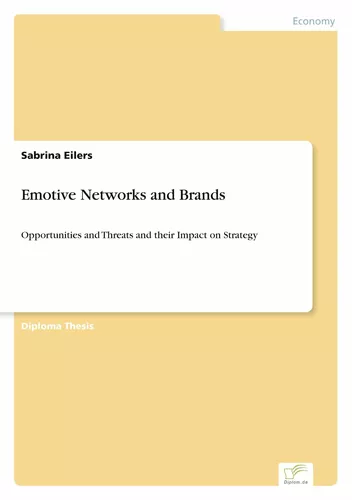Skip to the end of the images gallery Navigation umschalten
Skip to the beginning of the images gallery Navigation umschalten

Emotive Networks and Brands
Opportunities and Threats and their Impact on Strategy
Paperback
92 Seiten
ISBN-13: 9783838671413
Verlag: Diplom.de
Erscheinungsdatum: 25.08.2003
Sprache: Englisch
Farbe: Nein
74,00 €
inkl. MwSt. / portofrei
Ihr eigenes Buch!
Werden Sie Autor*in mit BoD und erfüllen Sie sich den Traum vom eigenen Buch und E-Book.
Mehr erfahrenInhaltsangabe:Abstract:
Brands have existed for several hundreds of years. Farmers used to brand their cattle by burning a mark into their fur. Others engraved initials into their valuables. The mark showed who the possession belonged to or where the cattle or goods originated from. This tradition still lives on in the logos, names, symbols and designs companies give to their products and services to distinguish their offers from the others the competitors.
From a simple marking of possessions and origin, branding has come a long way. Nowadays, companies invest a great amount of resources into building, maintaining and nurturing their brands. In acquisitions, companies pay a huge amount of money for a brand. Take Nestlés acquisition of Rowntree, which owns brands like Kit Kat and Smarties, as an example. Nestlé paid five times the net asset value of Rowntree in order to acquire stable brands.
Why do companies pay such large sums of money for an invisible asset like a brand? The answer is simple: consumers do the same. Studies showed that consumers pay a far higher price for a product or service of a well-known brand they trust than for a comparable offer from a less well-know brand. Brands make up for a big chunk of a firms revenues today and make sales predictable.
As Internet and mobile communication grows in terms of users and becomes more important in their users lives, brands are unsure of how to handle this new medium in the digital age, since market dynamics have changed. Competition is more fierce, rumours spread worldwide in no time and brands lose emotional touch with their target segment. This change has been facilitated by online and mobile communication of peers. People have always formed peer networks, but today these networks are much more powerful and quicker.
Networks of consumers take over and steal power from established brands. Shell witnessed a worldwide protest against its plans of sinking the oil platform Brent Spar into the North Sea. Consumers avoided Shell stations and supported Greenpeace. Rumours of sweat shops in Asia run by Nike and Reebok have led to loss of face as a result of worldwide protests. On top of these threats, brands have to face the fact that they have no chance fighting these networks of consumers. At the same time, peer networks also open up many opportunities like a customized and personalized approach to every individual.
At the beginning of last century, the owner of a general store knew […]
Brands have existed for several hundreds of years. Farmers used to brand their cattle by burning a mark into their fur. Others engraved initials into their valuables. The mark showed who the possession belonged to or where the cattle or goods originated from. This tradition still lives on in the logos, names, symbols and designs companies give to their products and services to distinguish their offers from the others the competitors.
From a simple marking of possessions and origin, branding has come a long way. Nowadays, companies invest a great amount of resources into building, maintaining and nurturing their brands. In acquisitions, companies pay a huge amount of money for a brand. Take Nestlés acquisition of Rowntree, which owns brands like Kit Kat and Smarties, as an example. Nestlé paid five times the net asset value of Rowntree in order to acquire stable brands.
Why do companies pay such large sums of money for an invisible asset like a brand? The answer is simple: consumers do the same. Studies showed that consumers pay a far higher price for a product or service of a well-known brand they trust than for a comparable offer from a less well-know brand. Brands make up for a big chunk of a firms revenues today and make sales predictable.
As Internet and mobile communication grows in terms of users and becomes more important in their users lives, brands are unsure of how to handle this new medium in the digital age, since market dynamics have changed. Competition is more fierce, rumours spread worldwide in no time and brands lose emotional touch with their target segment. This change has been facilitated by online and mobile communication of peers. People have always formed peer networks, but today these networks are much more powerful and quicker.
Networks of consumers take over and steal power from established brands. Shell witnessed a worldwide protest against its plans of sinking the oil platform Brent Spar into the North Sea. Consumers avoided Shell stations and supported Greenpeace. Rumours of sweat shops in Asia run by Nike and Reebok have led to loss of face as a result of worldwide protests. On top of these threats, brands have to face the fact that they have no chance fighting these networks of consumers. At the same time, peer networks also open up many opportunities like a customized and personalized approach to every individual.
At the beginning of last century, the owner of a general store knew […]
Eigene Bewertung schreiben










Es sind momentan noch keine Pressestimmen vorhanden.